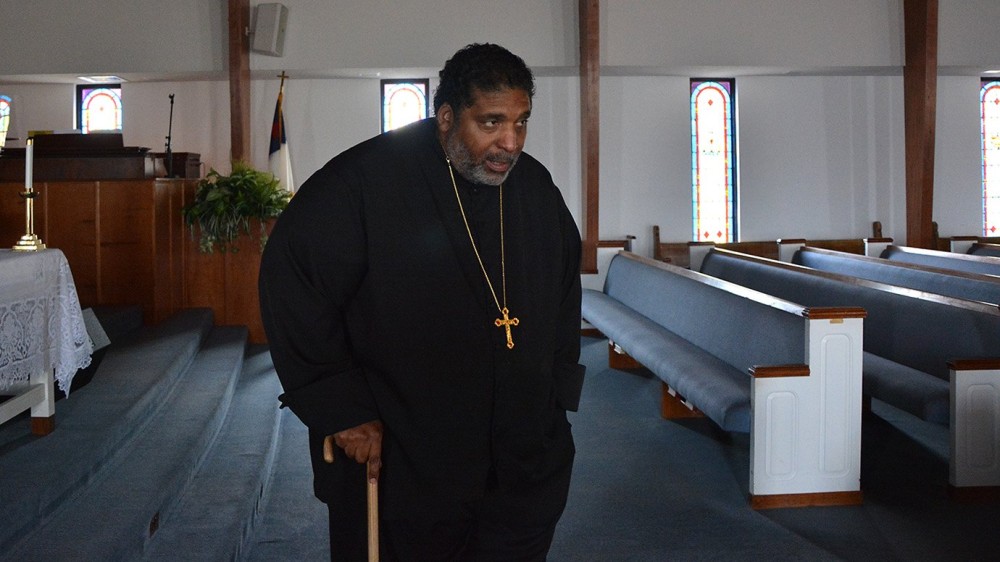William Barber II escorted out of movie theater, denied disability accommodations

William Barber II at Greenleaf Christian Church in Goldsboro, NC, on March 26, 2022. (RNS photo/Jack Jenkins)
William Barber is no stranger to being escorted by police away from scenes of protest. The Disciples of Christ pastor and civil rights organizer has been arrested multiple times at nonviolent demonstrations on behalf of voting rights, a federal minimum wage and other social justice issues.
But even Barber was surprised to find himself being escorted by police out of a showing of The Color Purple at Greenville, North Carolina’s AMC Fire Tower 12 movie theater on Tuesday after employees barred the minister from using his own chair to watch the movie with his 90-year-old mother.
“It’s one of those things where I don’t know how much longer I’ll have to do things like that with her,” said Barber, who co-chairs the Poor People’s Campaign and recently founded the Center for Public Theology & Public Policy at Yale Divinity School.
Barber, 60, has been public about his battle with a painful chronic form of arthritis known as ankylosing spondylitis. He walks haltingly using two canes and said in an interview that he is unable to sit in a wheelchair or in low chairs. He travels with his own chair and almost always uses it instead of the seating provided in public spaces.
“My chair has been everywhere,” Barber said. “In hospitals, in restaurants, in airports, in the White House and in Congress. It’s a need that I have because I face a very debilitating arthritic condition.”
Barber brought his chair as usual to the AMC theater, he said, taking care to place it in the handicap cutout so it wouldn’t obstruct any pathways or sightlines.
According to Barber, management claimed the chair was a fire code violation and said the theater only accommodates wheelchairs. Barber insisted that the Americans with Disabilities Act requires the theater to make accommodations, he said, and told the employees he had never encountered an issue with the chair elsewhere. When he asked to see the theater’s accommodation rules, which weren’t posted, Barber said, management allegedly told him they didn’t have the rules in writing.
As the previews played on the screen, two police officers approached Barber and said the theater wanted him removed.
“I’m gonna take you out,” one police offer told Barber in a video Barber provided to media.
“I cannot go out in good conscience,” Barber responded in the video. The recording shows the police officers walking behind and alongside Barber as he slowly exited the theater, a cane in each hand.
In an interview, Ryan Noonan, a spokesperson for AMC Theatres, said, “We sincerely apologize to Bishop Barber for how he was treated, and for the frustration and inconvenience brought to him, his family, and his guests.” Noonan said that AMC’s chairman and CEO, Adam Aron, had contacted Barber and plans to meet with him next week.
Noonan also made clear that AMC welcomes people with disabilities. “Our theatre teams work hard to accommodate guests who have needs that fall outside of the normal course of business,” he added.
“This is not the ancient world, where people who are sick are pushed to the side and told, ‘You can’t participate,’” Barber said in an interview. “With our laws, you have to make the accommodation.”
The Americans with Disabilities Act requires businesses to provide people with disabilities an equal opportunity to access their services or goods.
Barber declined to discuss whether he would be pursuing legal action. But he insisted that the important takeaway wasn’t that this happened to him—but that it could happen to anyone with disabilities.
“I always look at things through the lens of, if it happened to me, it’s really not about me,” he said. “I really am worried about how many other people feel that they can’t go out, they can’t go somewhere.” —Religion News Service




